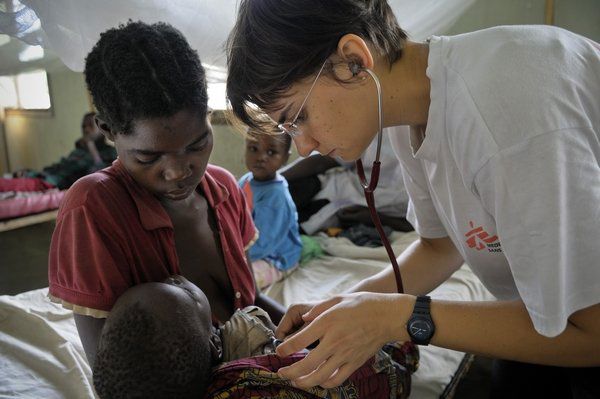On 25th of April, the annual World Malaria Day, many health organisations will highlight important gains in fighting this deadly disease that claims more than one million lives every year. But despite notable progress in terms of innovation and investment, MSF continues to see continuously high rates of malaria in several African countries. In DRC, MSF has observed infection rates above emergency thresholds in several zones over the last six months, which can be partially attributed to a dysfunctional surveillance system, failure of the health system to respond to elevated levels of malaria, poor organisation and lack of diagnostic testing and drugs.
Equally worrying are the continuing reports of emerging cases of drug resistant malaria in Thailand, Myanmar and Cambodia. ACT (Artemisinin Combination Therapy) is currently the only effective drug to treat malaria. MSF administered ACT to nearly one million patients during 2010 in more than 30 countries. The emergence of resistance to ACT also in Africa would aggravate an already disastrous public health problem, as there is simply no effective alternative drug available to treat this deadly disease.
The risk factors which could lead to the rise of drug resistance are all present in Africa and need to be eliminated. Access to high quality care and treatment is still far too limited, leading to the use of substandard and fake drugs. Drugs are often taken in too small quantities or treatment is interrupted because of high cost or lack of awareness about the importance of completing the full course. Despite the existence of cheap rapid diagnostic tests that can confirm if the patient has malaria or not in just 15 minutes, antimalarial drugs are often given and taken without proper diagnostics, which leads to overuse of drugs when they are not needed.
Several measures have to be taken urgently: more stringent malaria prevention and treatment initiatives, investment in health promotion, efforts to improve adherence to treatment, as well as measures to further reduce transmission. National malaria programmes need to regularly monitor drug efficacy and to be prepared to take action if reduced efficacy is detected. And in places where there is already resistance or reduced efficacy of drugs, concentrated efforts are needed to contain the spread of drug-resistant strains of malaria.
A comprehensive package to detect, treat, monitor and prevent malaria will save more lives today, and gives the highest likelihood to avert – or at least delay as long as possible - any further emergence of resistance to the only lifesaving antimalarial drugs that exist in the world today.
Equally worrying are the continuing reports of emerging cases of drug resistant malaria in Thailand, Myanmar and Cambodia. ACT (Artemisinin Combination Therapy) is currently the only effective drug to treat malaria. MSF administered ACT to nearly one million patients during 2010 in more than 30 countries. The emergence of resistance to ACT also in Africa would aggravate an already disastrous public health problem, as there is simply no effective alternative drug available to treat this deadly disease.
The risk factors which could lead to the rise of drug resistance are all present in Africa and need to be eliminated. Access to high quality care and treatment is still far too limited, leading to the use of substandard and fake drugs. Drugs are often taken in too small quantities or treatment is interrupted because of high cost or lack of awareness about the importance of completing the full course. Despite the existence of cheap rapid diagnostic tests that can confirm if the patient has malaria or not in just 15 minutes, antimalarial drugs are often given and taken without proper diagnostics, which leads to overuse of drugs when they are not needed.
Several measures have to be taken urgently: more stringent malaria prevention and treatment initiatives, investment in health promotion, efforts to improve adherence to treatment, as well as measures to further reduce transmission. National malaria programmes need to regularly monitor drug efficacy and to be prepared to take action if reduced efficacy is detected. And in places where there is already resistance or reduced efficacy of drugs, concentrated efforts are needed to contain the spread of drug-resistant strains of malaria.
A comprehensive package to detect, treat, monitor and prevent malaria will save more lives today, and gives the highest likelihood to avert – or at least delay as long as possible - any further emergence of resistance to the only lifesaving antimalarial drugs that exist in the world today.


